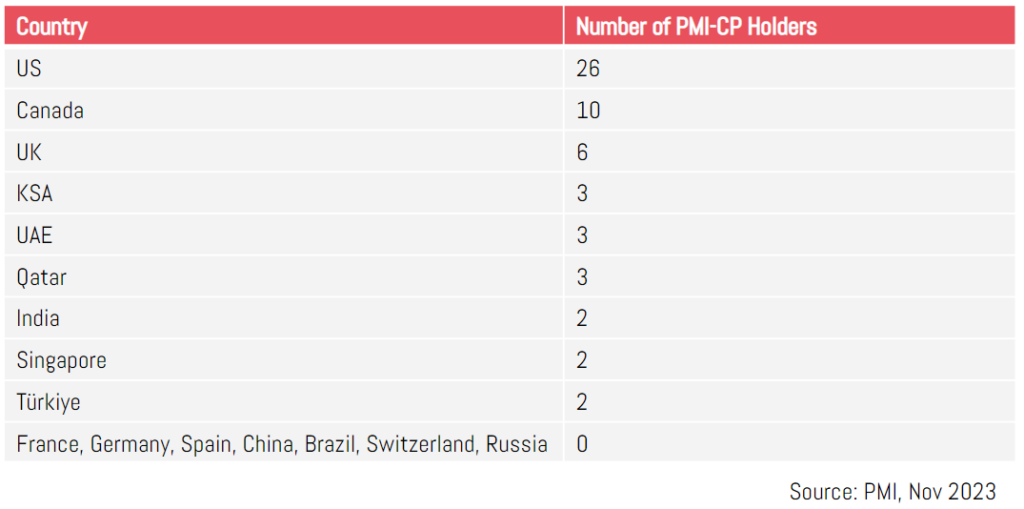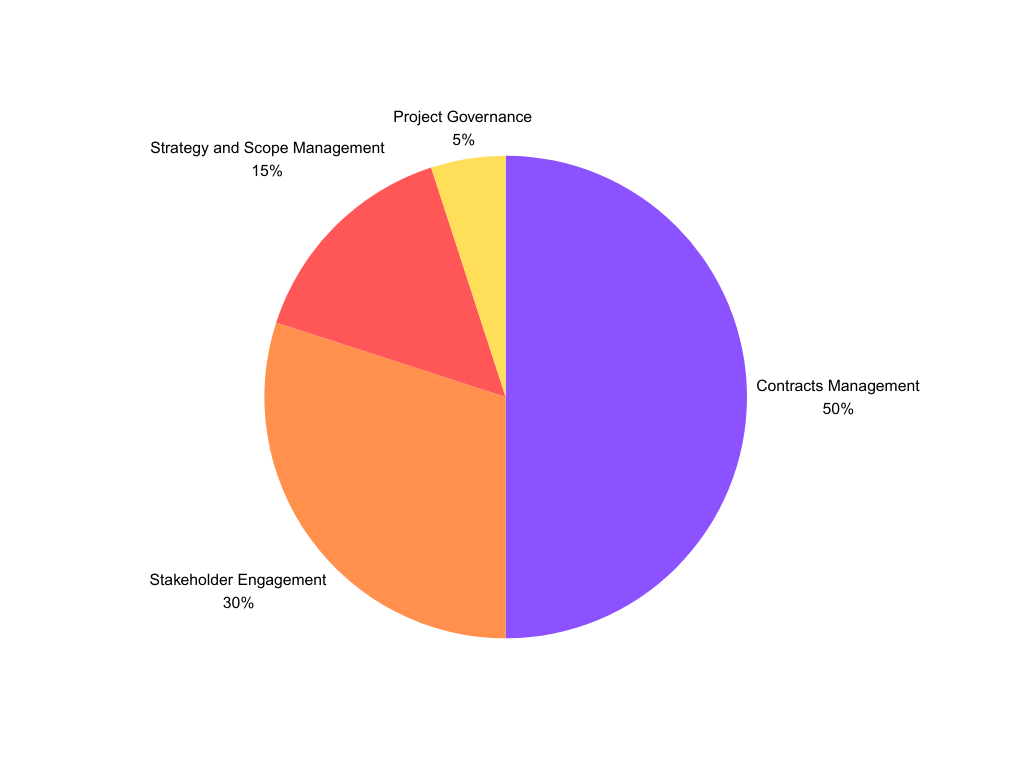PMI-CP, which stands for PMI Construction Professional, is a project management certification for construction professionals. Launched in February 2023, this credential is designed to help construction project managers and professionals navigate the increasingly complex challenges in the construction field, according to the Project Management Institute.
The PMI Construction Professional (PMI-CP)™ certification is crafted to represent a valid proof of your knowledge and experience when it comes to managing construction projects. If you want to demonstrate your skills in leading and keeping large and complex built environment projects on track, you should pursue this credential!
Whether you’re a project manager, an engineer, an architect, or an executive, earning the PMI-CP certification can be your stepping stone to building a successful career in the construction field. As of November 2023, PMI-CP is held by a total of 57 professionals around the world according to PMI. This number had doubled by mid-2024.

Exam Prerequisites
Sitting for the PMI-CP certification exam has no education requirements. However, 3+ years of work experience in the construction/built environment field is a must to qualify for the exam. Before you can apply, you’ll have to complete 4 self-paced e-learning courses.
To apply for the PMI-CP exam, you will need to fill in and submit some information including your experience in the construction field. Some applicants may be selected randomly for audit during the application process. In this case, you will need to provide proof of your experience.
Exam Format
The exam consists of 120 multiple-choice questions and a duration of 230 minutes. During the PMI-CP examination, you can take two 10-minute breaks: the first after you complete questions 1- 40 and the second when you reach question 80.
You’ll have to confirm that you reviewed all of your answers before taking each of the 10-minute breaks since you will not be able to return to the questions from the previous section when you are signed back.
Exam Syllabus
In order to evaluate and verify your industry knowledge and experience as a professional in the construction sector, the PMI-CP exam tests your information and proficiency in 4 main domains:
- Contracts management (50% of exam questions)
- Stakeholder management (30% of exam questions)
- Strategy & Scope management (15% of exam questions)
- Project governance (5% of exam questions)

You can check the Exam Content Outline (ECO) to go more in-depth into each of the domain’s tasks, enablers, and details.
Exam cost
The PMI-CP exam cost comprises the exam fee plus the cost of the 4 self-paced models mentioned above in the Exam prerequisites section.
- Construction Project Communication (Course + Micro-credential Exam): $140
- Interface Management in the Built Environment (Course only): $69
- Scope and Change Order Management in the Built Environment (Course only): $69
- Contract and Risk Management in the Built Environment (Course only): $69
After completing all 4 e-learning models, you’ll be able to apply for the exam and take it either at a testing center or online, which either way will cost you a fee of $349.00. The total cost for PMI-CP is $696.

You will not be charged for rescheduling or canceling your exam 30 calendar days before the appointment date. However, you will be charged a fee of $70 if you reschedule or cancel your exam within 30 calendar days of the exam appointment.
If you do not pass your first attempt, you can retake the exam 3 times within a one-year period. Once you get your PMI-CP certification, you’ll have to maintain it by earning 30 Professional Development Units (PDUs) within 3 years and paying a predetermined renewal fee.
How I Passed the PMI-CP Exam
I passed my PMI-CP exam on the 1st of October scoring above target in all 4 domains. My preparation journey took 6 months: 3 months to complete the online self-paced models and 3 months to prepare and take the exam. My studying was sporadic due to my day-to-day job duties. Most of the preparation took place during weekends, but I had to skip some weekends for different reasons. Looking back, I do not recommend extending your exam preparation for such a long duration. A 2 to 4-month period is enough and way more practical to have a fresh memory of all the information you learned.
The communication micro-credential that you have to earn in order to be eligible for the exam is way easier than the PMI-CP exam. What I found to be annoying about the questions though is that they mainly rely on memorization. Therefore, it’s important to take them right after completing the e-learning course. These questions are not situational, they’re rather direct. I’d say time management is also key to passing the micro-credentials. A colleague of mine failed the micro-credential because he took it lightly. So, keep in mind that the micro-credential requires the same serious and focused preparation as the formal exam.
When I took the exam, 7 courses were required. Later in February 2024, PMI reduced the number to only 4 courses. If you are curious about the changes, you can check out this video. After completing the courses, I applied for the final exam. I received the approval after 1 or 2 days. Some people go through an audit which requires providing a justification of work experience in the construction field. Afterward, it took me 2 months to decide to schedule my exam in a 2 weeks period.
At this point, I was a bit nervous because I didn’t know what to expect. I found nothing on the internet; no prep courses or books, just one mock exam on a website that ended up being a scam. I asked some people on LinkedIn about their experiences with the exam and they said that the material of the e-learning courses was helpful. So, I went back and skimmed the content of the courses once again. That’s the only thing I did to prepare for the exam.
I chose to take the exam online. The check-in process went smoothly. The proctor asked me to turn the camera on to check the office and when they did, they asked me to remove a garbage bin from the office. During the exam, they told me to keep my face within the camera frame once and that’s it.
Some of the exam questions were straightforward. However, many were actually quite difficult, especially the ones with similar options that made it difficult to choose the right answer. All of the exam questions are situational, even the questions asked directly were presented within the context of a particular situation.
The body of the questions was long including up to 5 sentences. I usually skip reading the first two sentences to save time, and if I figure out the answer, I move on, otherwise, I go back and read the whole question. In the end, I had 10 remaining questions and only 5 minutes left. So, I just read the final sentence including the question, and selected the most suitable option.
Time management is really crucial to pass your exam. In my case, time ended and I didn’t manage to answer the last question. Regardless, I got a “Congratulations” message on the screen which I did not expect as I thought I’d receive my result a few days after the exam. After two days, I received the result report showing an Above Target score in all 4 domains.
PMI-CP Exam Tips
To recapitulate my experience, here are the main points that I think a PMI-CP aspirant should keep in mind:
- The exam is aligned with the content of e-learning courses.
- Understanding the use of the “Compass” tool and its role in improving project team communication.
- Understanding how and when to use the Monte Carlo technique.
- Changes should ALWAYS be submitted to the Change Control Board (CCB)
- Knowing the difference between project delivery methods including Design-Bid, Design-Bid-Build, Integrated project delivery (IPD), and Construction Management At Risk (CMAR).
- Understanding Value engineering and how it’s used to solve problems, reduce costs, and improve quality.
- Being able to interpret the values of the Project Definition Rating Index (PDRI)
- Knowing the common sections of a contract.
- Understand the importance of governance to ensure accountability and effective decision-making.
- Apply the appropriate dispute resolution technique
- Understand how and when to use the “Obeya” tool to promote effective and timely communication.
- Getting familiar with implementing Interface management and using its terminology.
Considering how challenging it was to find prep material for the exam, I decided to create a set of practice questions to serve as guidance on what to expect in your PMI-CP exam. You can check out these questions either on Amazon or Udemy.
I hope sharing my experience helps you successfully pass your exam! If you have any questions or inquiries, don’t hesitate to reach out!
